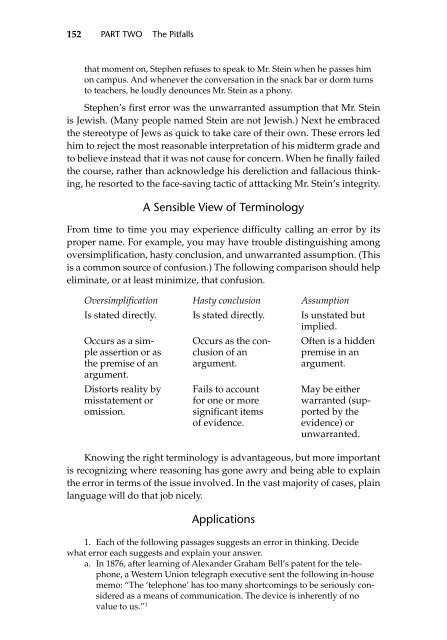Beyond Feelings
Beyond Feelings
Beyond Feelings
Create successful ePaper yourself
Turn your PDF publications into a flip-book with our unique Google optimized e-Paper software.
152 PART TWO The Pitfalls<br />
that moment on, Stephen refuses to speak to Mr. Stein when he passes him<br />
on campus. And whenever the conversation in the snack bar or dorm turns<br />
to teachers, he loudly denounces Mr. Stein as a phony.<br />
Stephen’s first error was the unwarranted assumption that Mr. Stein<br />
is Jewish. (Many people named Stein are not Jewish.) Next he embraced<br />
the stereotype of Jews as quick to take care of their own. These errors led<br />
him to reject the most reasonable interpretation of his midterm grade and<br />
to believe instead that it was not cause for concern. When he finally failed<br />
the course, rather than acknowledge his dereliction and fallacious thinking,<br />
he resorted to the face-saving tactic of atttacking Mr. Stein’s integrity.<br />
A Sensible View of Terminology<br />
From time to time you may experience difficulty calling an error by its<br />
proper name. For example, you may have trouble distinguishing among<br />
oversimplification, hasty conclusion, and unwarranted assumption. (This<br />
is a common source of confusion.) The following comparison should help<br />
eliminate, or at least minimize, that confusion.<br />
Oversimplification<br />
Is stated directly.<br />
Occurs as a simple<br />
assertion or as<br />
the premise of an<br />
argument.<br />
Distorts reality by<br />
misstatement or<br />
omission.<br />
Hasty conclusion<br />
Is stated directly.<br />
Occurs as the conclusion<br />
of an<br />
argument.<br />
Fails to account<br />
for one or more<br />
significant items<br />
of evidence.<br />
Assumption<br />
Is unstated but<br />
implied.<br />
Often is a hidden<br />
premise in an<br />
argument.<br />
May be either<br />
warranted (supported<br />
by the<br />
evidence) or<br />
unwarranted.<br />
Knowing the right terminology is advantageous, but more important<br />
is recognizing where reasoning has gone awry and being able to explain<br />
the error in terms of the issue involved. In the vast majority of cases, plain<br />
language will do that job nicely.<br />
Applications<br />
1. Each of the following passages suggests an error in thinking. Decide<br />
what error each suggests and explain your answer.<br />
a. In 1876, after learning of Alexander Graham Bell’s patent for the telephone,<br />
a Western Union telegraph executive sent the following in-house<br />
memo: “The ‘telephone’ has too many shortcomings to be seriously considered<br />
as a means of communication. The device is inherently of no<br />
value to us.” 1


